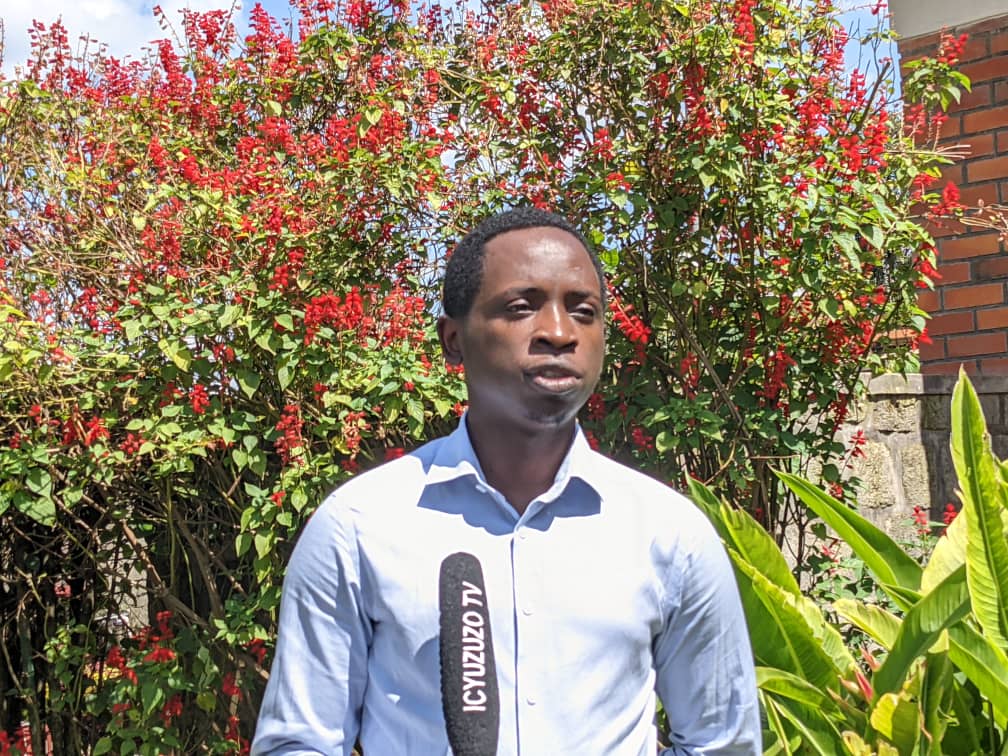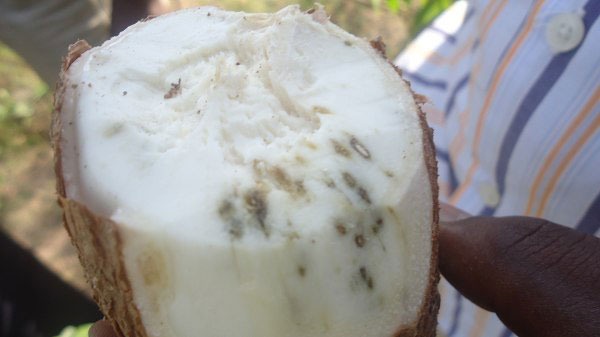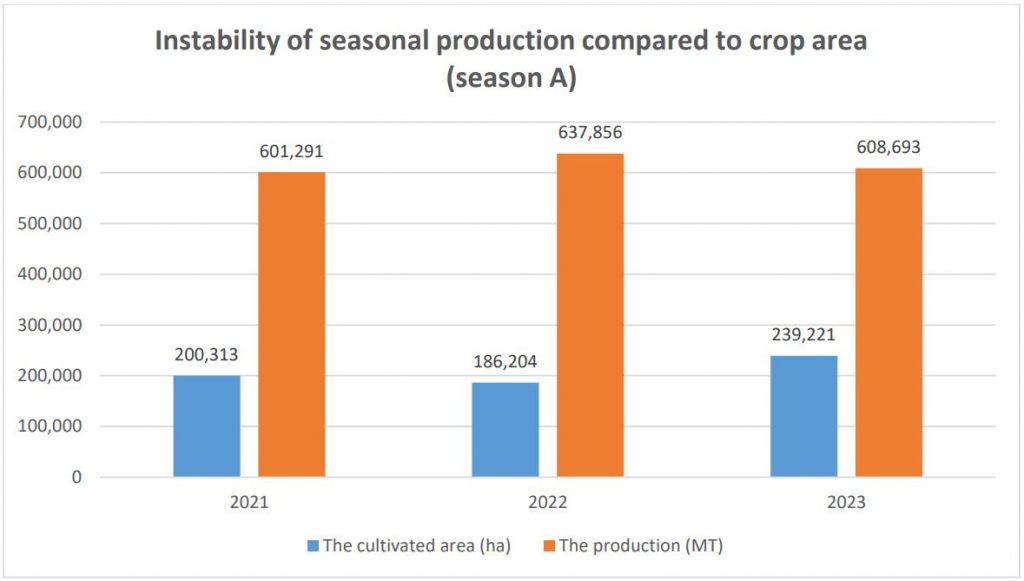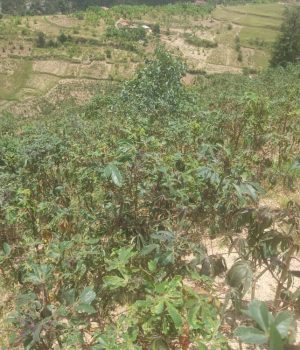Scientists strongly advocate for the adoption of Genetically Modified Organisms (GMOs) in African countries, emphasizing that it is a crucial solution to combat the pressing challenge of food shortages.
GMO farming has proven to significantly boost yields, resulting in remarkable outcomes. For instance, a single banana can reach a weight of approximately 200 kilograms, while a cassava tree can yield as much as 50 kilograms. These astonishing crop yields clearly highlight the substantial advantages of GMO farming over traditional agricultural methods.
Dr. Anastas Nduwumuremyi, a researcher at RAB (Rwanda Agriculture Board) working on cassava crops and new seeds, disclosed an ongoing research initiative focused on developing disease-resistant cassava seeds.
“Our research aims to identify cassava varieties that are naturally resistant to diseases. We took the seeds commonly grown by farmers in Mase14 (Called Gikungu in Kinyarwanda) and introduced a small portion of the virus that typically attacks the plant. This triggers the plant’s immune system response, making it aware of the virus and equipping it to defend against infection.” He explained,

Mohamed Hassan, President of The World Academy of Sciences (TWAS), President of the Sudanese National Academy of Sciences (SNAS) an esteemed scientist and director of the International Institute for the Advancement of Science (World Academy of Sciences), emphatically affirms that modern agricultural technology is indispensable for African countries to achieve increased production.
Pacific Nshimiyimana, affiliated with the Alliance for Science Rwanda—an international organization dedicated to promoting the use of science and technology for the benefit of society—suggests that when farmers employ agricultural technology, they aim to enhance production levels.
“By utilizing technology in agriculture, farmers can allocate the funds they would have otherwise spent on pesticides towards other beneficial activities. Farming practices enhanced by technology not only contribute to increased profitability for the farmer but also mitigate the impact on human health. While conventional chemical-based methods effectively eliminate insects, they also pose risks to our well-being.” Pacific Nshimiyimana remarked.

The people in general and the farmers in particular are waiting for the answer….
Despite the promising resistance of these specially developed seeds against various crop diseases and disasters, farmers face significant hurdles in accessing and adopting them.
Nyirakamana Jeannette, an active participant in the cassava cultivation in Mbuye Sector, Ruhango District, expressed her frustration over the delay in receiving the promised multiplied seeds from officials.
“Unfortunately, these seeds that could potentially secure our harvest and prevent our children from suffering from hunger are currently unavailable for us to plant. However, if we are provided with these seeds, we are willing to cultivate them without hesitation.” She lamented,
Hakizimana Aimable, a dedicated cassava agricultural worker in the Kinazi Sector of Ruhango District, recently voiced his distress over substantial losses incurred due to cassava damage.
He passionately appealed for access to disease-resistant seeds to mitigate future risks.
Reflecting on the dire situation, he shared, “The consequences of this crop failure are truly devastating, particularly for farmers like me who have invested in extensive land cultivation and have taken loans from the Sacco. Witnessing the demise of our potato crops leaves us overwhelmed, as the daunting task of repaying the loan becomes seemingly insurmountable.”

According to data from the National Institute of Statistics in Rwanda (NISR), during the first season (season A) of 2023, a substantial increase of 28.5% was recorded in the cultivation of cassava.
Approximately 239,000 hectares of land were dedicated to cassava cultivation, representing a significant expansion compared to the same season of the previous year.
The production of cassava in the first quarter of the 2023 crop experienced a decrease of 4.6% compared to the previous year, amounting to approximately 608,000 tons.
This decline occurred despite an increase in the cultivated area, which reached 239,000 hectares—a growth of 28.5% compared to the same season in 2022.
In the preceding year (2022), cassava was planted on 186,000 hectares, indicating a reduction of 7% compared to the corresponding season in 2021.
Nevertheless, the production during that period reached around 638,000 tons, indicating a 6% increase compared to the first quarter of the 2021 crop (season A 2021).
The yield of potatoes per hectare in the first quarter of the 2023 harvest was recorded at 13.5 tons, slightly lower than the 14 tons achieved in the previous year.

Controversy is all over GMOs, but research has come a long way…
The debate surrounding genetically modified organisms (GMOs) extends beyond concerns about their impact on human health.
Collaborative assessments conducted by the United Nations Food and Agriculture Organization (FAO) and the World Health Organization (WHO) have determined that GMO foods available on the market pose no harm.
With the African continent facing a food crisis, particularly in regions below the Sahara Desert, research indicates that GMOs could provide a solution.
According to February 2023 figures from the World Food Program, over 349 million people across 79 countries experience food insecurity, and there are growing concerns that this number will continue to rise.
Globally, 190.4 million hectares were dedicated to cultivating GMO crops in 2019 across 29 countries. This technology has made a significant contribution to food security, fostering climate-resilient agriculture and transforming the lives of approximately 17 million farmers and their families worldwide.
Countries such as Vietnam, the Philippines, and Colombia have witnessed a doubling of their agricultural production as a result of adopting GMO technology.
In 2018, Rwanda’s National Agency for Environmental Protection (REMA) announced its preparation of a law to regulate the use of GMOs.
By Mukanyandwi M. Louise
















